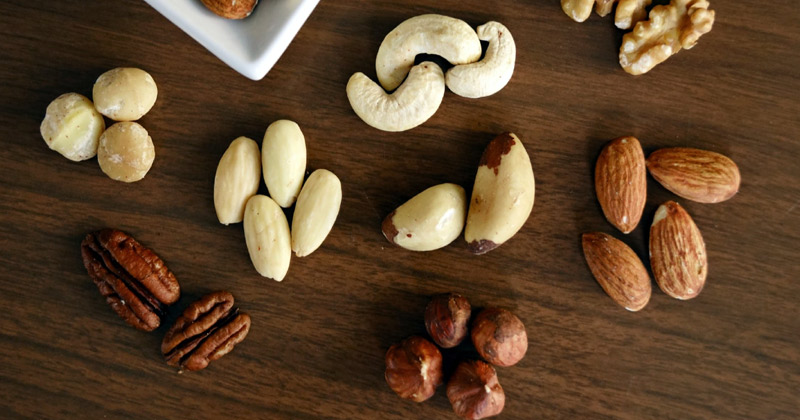Almonds, walnuts, or macadamia nuts, everyone should snack on a handful of nuts every day. Because these small kernels are true power packs and rich in valuable fatty acids, minerals, vitamins, and trace elements. Each nut has its strengths. What are the various health benefits of nuts, why are they the miracle of nutrients?

Many see the pointer of the weighing scale move upwards, after all, nuts contain a lot of fat. With some over 600 kilocalories per 100 grams, the snack can quickly replace a major meal. Nevertheless, enjoyed in moderation, the body benefits from the healthy ingredients in the nuts, including linoleic acid, omega-3, and omega-6 fatty acids.
Nuts Reduce The Risk of Heart Disease – Health Benefits of Nuts
Researchers emphasize that these fatty acids have a positive effect on cholesterol levels, keep the vessels healthy and thus reduce the risk of arteriosclerosis and coronary heart diseases. Consuming nuts regularly could even reduce the risk of a fatal heart attack by 39 percent and a non-fatal heart attack by 32 percent. A handful of nuts should be eaten daily.
Macadamia Nuts Have The Most Omega Fatty Acids

All nuts contain vascular protective omega-3 and omega-6 fatty acids that help keep the vessels healthy. There are many health benefits of Macadamia nuts, they have the highest proportion of polyunsaturated fatty acids among all types of nuts along with being rich in B vitamins and minerals.
In addition to Brazil nuts, macadamia nuts also provide the greatest calorie boost. 100 grams of macadamia nuts have around 700 kilocalories.
Walnuts Are Good Vascular Protectors – Health Benefits of Walnuts

Walnuts are also vascular protectors because they are rich in valuable linoleic acid. 100 grams contain 7.5 grams of omega-6 fatty acids. Also, walnuts contain a lot of tryptophan, which not only has a calming effect but is also converted into serotonin in the body and is mood-enhancing.
Incidentally, tryptophan is also abundant in cashew nuts, which like almonds are stone fruits.
Suggested Read: What are the Health Benefits Of Cinnamon?
Nuts Prevent Cravings
In addition to the healthy fats, nuts also contain a lot of phytochemicals, fiber, vitamins, minerals, and trace elements. They are also good suppliers of protein. As a result, they keep you full and ward off cravings as a snack.
They also provide the body with energy and promote concentration. Above all, they suppress the untimely cravings that lead to overeating and increased weight.
Peanuts Have a High Protein Content – Health Benefits of Peanuts
Peanuts have a particularly high protein content of 25 percent, which are not nuts but are legumes. They are therefore well suited as a small snack in between when the hunger knocks. Even almonds, which strictly speaking belong to the stone fruit, satisfy and reduce the hunger for carbohydrates.
Brazil Nuts And Hazelnuts Are a Protective Shield For The Body

Brazil nuts are also not real nuts but count among the capsule fruits. They contain a particularly large amount of selenium. Six nuts bring around 63 micrograms of the nutrient selenium.
Adult men should consume 70 micrograms of selenium a day, women 60 micrograms. Among other things, selenium is an important protective shield against free radicals and strengthens the body’s defenses.
A lot of vitamin E is contained in hazelnuts. Vitamin E is also important for the defense against aggressive substances. 50 grams cover an adult’s daily needs.
Chestnuts Are Real Fiber Packages – Health Benefits of Nuts

Chestnuts have the lowest fat and calorie content among all nuts as 100 grams only contain 200 kilocalories. They contain more than 40 percent carbohydrates and almost 50 percent water. And if you eat 100 grams of chestnuts, you cover almost a third of your daily fiber requirements.
Suggested Read: Importance Of Fats In The Body. Why Does Fat Often Taste So Good?
Improper Storage Makes Nuts Rancid
The best way to keep the nuts fresh for as long as possible is to keep them cool, dark, dry, and well packaged. Due to the high-fat content, they quickly become rancid. Then they not only smell and taste bitter and musty but also form breakdown products, some of which are harmful to health and can cause gastrointestinal upset.


